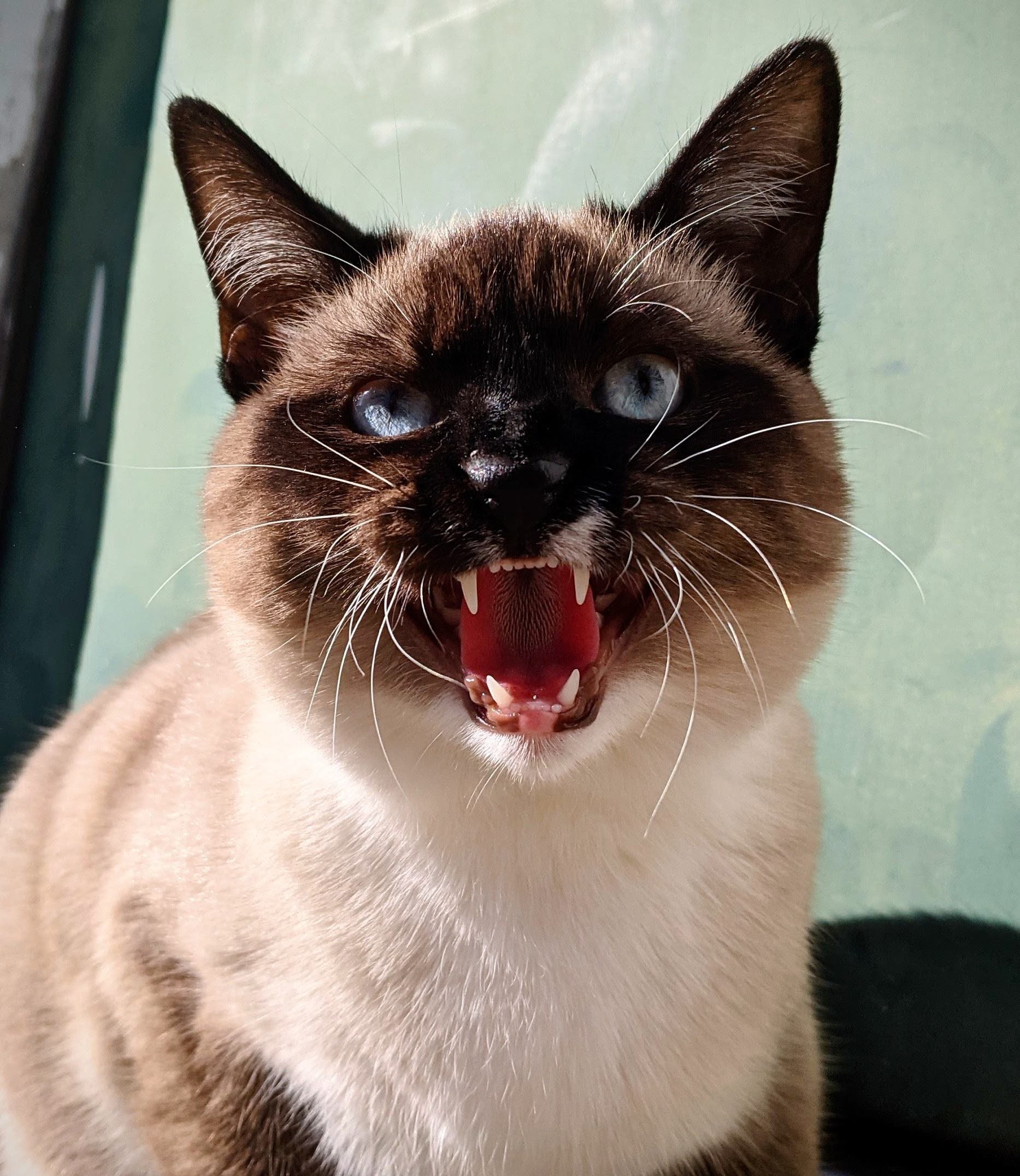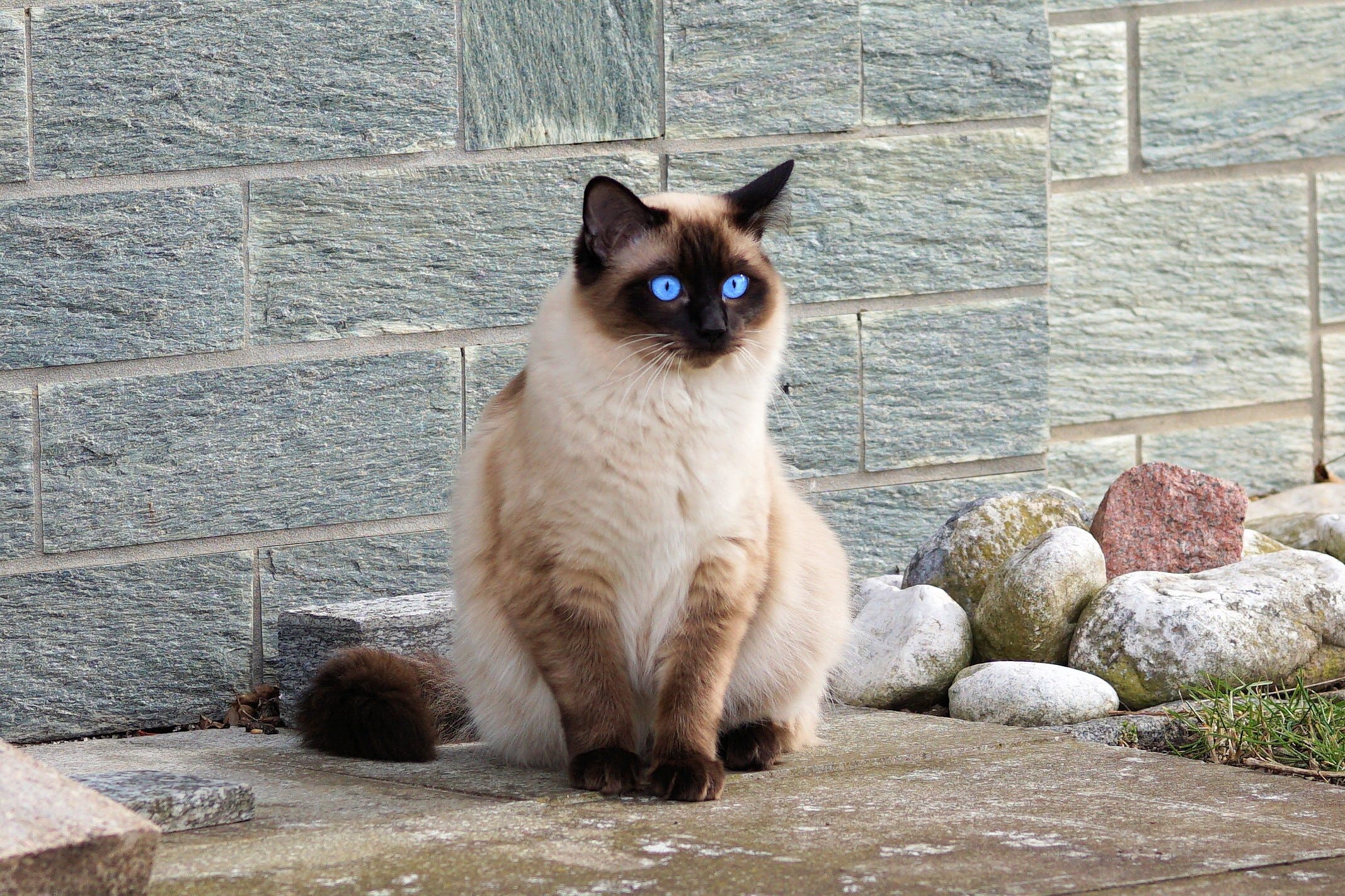Are Siamese Cats Mean?

Known for their brooding demeanor, sharp wits, and sometimes feisty nature, one is left to wonder if the Siamese cats are as mean as many profess.
Your Siamese can be anything you want it to be. You can have them all cushy and warm with the right pampering or all feisty and violent when threatened. It’s all up to you to decide what you want them to be.
In this article, we will be discussing the long-purported rumors about Siamese cats being mean and what you can do to be in their good book. Let’s roll
What traits does a Siamese Cat Posses?
A Siamese cat can be a blend of many things. However, there are certain traits you are very likely to notice in your feline when it comes to interaction and general socialization. These will include:
- Territorial
- Mischievous
- Domineering
- Violent
Territorial
Siamese are territorial and at the same time selective of who they let into their space, and when an intruder tries to get in the way, the Siamese are all out of bunkers.
The need to maintain their space and avoid unwanted guests often leads people to believe that the Siamese is a mean feline and should be avoided. While the assumptions sound valid, it is important to know that it is just a natural trait inherent in them and not them being mean.
Mischievous
When you are looking for naughtiness, then a Siamese is one with a bag of mischievousness. You could find your Siamese tearing at the foam in your sofa, meowing endlessly, or doing some very irritating things you wish it could stop, that is just one trait of your feline. It necessary doesn’t mean it is mean.
Domineering
Your Siamese wants to feel in charge, it is one way of feeling protected and loved. While it doesn’t want an occasional lap sitting and caressing, knowing that it has some level of independence and control over stuff belonging to it could appear as being mean if someone tries to take its possession.
Violent
Unless threatened and as a means to fight back, your Siamese will most likely resort to violence if it has to, and it spares nobody nor anything that tries to get in its way,
A wandering child who tries to play with a Siamese kitten can make the feline think otherwise about the baby human and in the worst case resort to defending her kitten, when this happens, it is common to think that the Sia cat is nothing but mean.
So, the basic trait of a Siamese should not be mistaken for being mean, these traits are what make up the unique attributes of your feline. However, that your cat possesses this natural trait doesn’t mean that they aren’t prone to aggressive behaviors and the next section seeks to explore that
Why are Siamese Aggressive?
Despite their natural tendencies to come off as tough and pugnacious, certain triggers can cause your Siamese to be very aggressive and this includes:
- Agitated
- Social Aversion
- Stressed
- Fear
- Past Experience
- Health
Agitated
When your Siamese is agitated, most likely it could be aggressive.
A constant poking at it and being bullied will have a Siamese snarl and possibly bite if the action is not stopped. Hence, why they appear to be aggressive.
Social Aversion
Time and again, Siamese favor their alone time and unless you are part of the family they cherish, you should stay clear when it comes to socializing with these felines. Allow them to come to you.
Little cats and other house pets who extend an olive branch to the Siamese are outrightly scowled at or hissed at because the cat in its totality fervors solitude, only truly allowing pets it wants into its sphere,
When a pet or human crosses the boundaries set by a Siamese, the aggressive side of this creature shows up and accounts for why you will likely find them on the wrong end.
Stressed
A stressed Siamese is a master of reverse psychology and in this case, can be aggressive when this happens.
Stressors that could trigger the Siamese include excessive noise, change in their routine, moving out of an old home and you name it. If not done properly, your cats go haywire and will be aggressive towards you.
Fear
A fearful Siamese is an aggressive cat. The need to protect itself though afraid is why you will have it being aggressive.
Its fear translates to a violent disposition and an aggressive fronting that if not taken into consideration can cause terrible damage.
Past Experience
Being one of the smartest cat species, a Siamese cat that was maltreated can come out to be very aggressive even when you as an owner are kind towards it. The cat will need a high level of reassurance from you before opening itself up.
Health
Feline Hyperesthesia which is a condition that causes your cat to be extremely sensitive to any form of touch and can lead to excessive scratching can lead to aggressiveness when being handled.
Other medical condition that can cause your cat to be aggressive includes Psychogenic Alopecia (hair loss, that arises from your Siamese constantly licking its fur).
Anxiety and boredom are among other factors that can trigger aggression from your feline. The good news though is these cats can be tamed. Here’s how
How to Tame an Aggressive Siamese.
Taming a Siamese is not a walk in the park and given their natural feisty and stoic disposition, there is a need to exhibit patience and some understanding when losing the leash on this cat breed.
Schedule a Playtime and stick to the routine
Although your Siamese may appear aloof and not in for fun, knowing the right way to infuse fun and sticking to this routine will go a long way in making them easy to relate with and also to care for.
Taking a calculated approach and carefully guiding them into their play schedule will have them opening up in the long run and becoming friendly over time.
Nutrition and Health.
Siamese are very particular with their grooming and will do anything to keep clean, as its parent, ensuring that they get the best medical care will make them one of the most amazing felines you’d have.
Grooming, the right nutrition, and giving them their space will do the magic in turning your once feisty cat into the most welcoming feline.
Faqs About Siamese Cats:
Q1: What makes Siamese cats unique? A: Siamese cats are known for their striking blue almond-shaped eyes, short coats with color points (darker color on ears, face, paws, and tail), and vocal personality. They are often social, affectionate, and have a sleek, slender body.
Q2: Are Siamese cats more vocal than other breeds? A: Yes, Siamese cats are known for their vocal nature. They are highly communicative and may use a range of vocalizations to express their needs, including meowing, chirping, and even “talking” to their owners.
Q3: What are the common health concerns for Siamese cats? A: Siamese cats may be prone to certain health issues, including respiratory problems and dental issues. Regular veterinary check-ups, proper dental care, and a balanced diet are important for their overall well-being.
Q4: Do Siamese cats have specific grooming needs? A: Siamese cats have short coats that require minimal grooming. Regular brushing can help reduce shedding and maintain their sleek appearance. Additionally, attention to dental care is crucial to prevent dental problems.
Q5: Are Siamese cats suitable for families with children? A: Yes, Siamese cats are generally sociable and can make wonderful family pets. They often form strong bonds with their owners, including children, and enjoy interactive play and attention.
Q6: Do Siamese cats have a specific diet requirement? A: Siamese cats don’t have unique dietary needs compared to other cat breeds. Providing well-balanced, high-quality cat food and ensuring access to fresh water is essential for their health.
Q7: Are Siamese cats indoor or outdoor cats? A: Siamese cats are adaptable and can be kept both indoors and outdoors. However, due to their social nature and potential sensitivity to temperature extremes, many Siamese cat owners prefer to keep them as indoor pets.
To Wrap Up
The myth that Siamese are mean may not be true. Their natural disposition and certain factors can cause them to act a bit jerky, however, with the right treatment and a heavy dose of patience, you can tame your cat into the most well-bred species ever.
If you find this article informative, do well to leave a comment in the comment section and check out other articles on the website.







Wonderful web site Lots of useful info here Im sending it to a few friends ans additionally sharing in delicious And obviously thanks to your effort